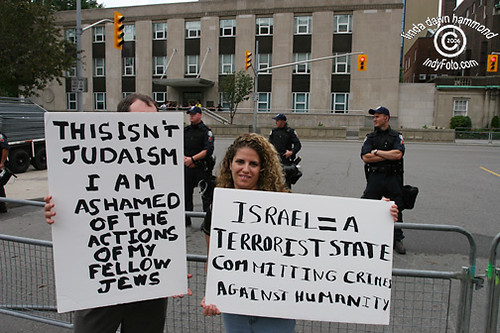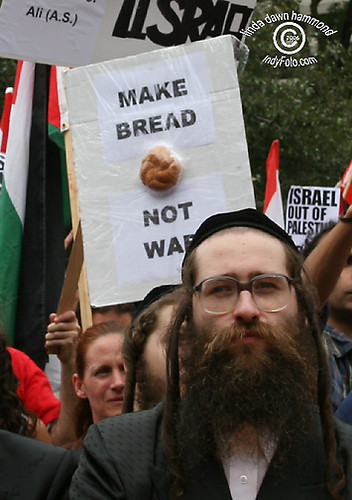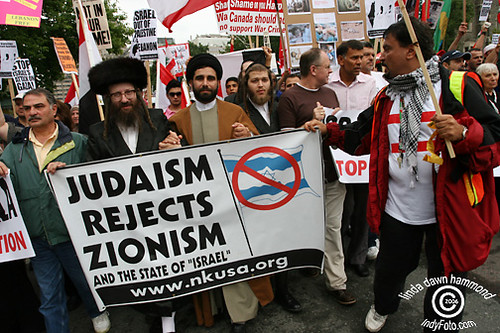STOP the ATTACK on Lebanon! Articles 3- What British Jews think of Israel
http://www.flickr.com/photos/56709485@N00/sets/72157594208421837/
STOP WAR INDYFOTO Set
18 July 2006 Home > News > UK > This Britain
What British Jews think of Israel
For Britain's 267,000 Jews, liberal by instinct and socially progressive, Israel represents their greatest hope and, at times, their deepest shame. The nation that was forged in the aftermath of the Holocaust was once regarded as a bold experiment in democracy and collective living. Now it stands accused of the same acts of terror with which it condemns its enemies. Linda Grant asks the children of the Diaspora how they see the Promised Land
Published: 18 July 2006
At the end of last week, already deep into the military and political crisis that had suddenly taken hold of Israel, Palestine and Lebanon, Lynne Sidkin waited anxiously for news of her 16-year-old son Sam. The previous weekend she had driven him from their family home in Wimbledon to a synagogue car-park in Stanmore to join an excited group of Jewish teenagers who were about to set off for a month in Israel.
A few days later, after a missile hit a hillside in Haifa, Sidkin received a text from the tour organisers, the Federation of Zionist Youth, saying that the kids were all fine and that they would ring later. Matter-of-factly, Sam told her that the place they were supposed to visit the next day had been bombed, so the itinerary was changing and they would be going elsewhere.
"They seemed detached from it, in a way," Sidkin says. "On Sunday night, when we dropped him off, emotions were running high, but there were no tears. The people in Israel can't run away from it and these children are there for a month. I'm anxious, but I'm not going to get on a plane to bring him back."
It seemed strange to me that Sam, an adored only child, long waited for, born of IVF treatment, would be sent off by his parents into the middle of a terrifying crisis at the heart of the Middle East at a time British tourists were being evacuated from Beirut at the prospect of all-out war between Israel and Hizbollah. But a summer in Israel has become a rite of passage for Jewish teenagers; throughout wars, intifada, peace processes and their breaking down, a steady stream have continued to arrive, the numbers fluctuating according to the political situation. This year, before the deteriorating military situation, participation was at an all-time high, with more than 1,300 British teenagers booked to take part - over 50 per cent of all Britain's Jewish 16-year-olds. Some went with the Orthodox youth group Bnei Akiva, some with Habonim, the socialist Jewish scouts (whose most famous alumnus is Sacha Baron Cohen), some with Netzer, the Reform synagogue youth wing, some with the Federation of Zionist Youth.
The Sidkins did not send Sam to Israel for a dose of Zionist indoctrination, but because they subscribe to a widespread view in the Jewish community that, as part of a small and rapidly assimilating ethnic minority in the UK, Jewishness can be reinforced by sending your children to the one place where Jews are everywhere. "Here in south London, Sam is mixing with very different people," Sidkin says. "He's very Anglicised, and one of his best friends is Muslim. This summer, he's going to be with people who feel more strongly about Israel than he does - and we want him to find out about his history. We want him to feel proud of being Jewish and his roots, because that's what I find is important in my own life."
When I asked her where she stood on the political spectrum regarding Israel, and what she thought of the recent events in Gaza and Lebanon, Sidkin replied: "I'm not heavily into politics. I watch the news but I don't have very strong views. You'd have to talk to my husband, but he isn't here at the moment."
As Sam passes through Israel, visiting a Druze [one of Israel's non-Jewish ethnic minorities] village last week, and helping to prepare Ethiopian children for their bar and bat mitzvahs, the British media is on fire with angry opinion and rhetoric, and the rights and wrongs of the escalating crisis have provoked a ferocious expression of opposing viewpoints inside the Jewish community itself. Ten days ago, it took only 48 hours for the organisation Jews for Justice for Palestinians to collect the names of 300 British Jews, including Harold Pinter, Mike Leigh and Gillian Slovo, together with small donations worth £10,000 to pay for a full-page advertisement in The Times condemning Israel's bombing of the power station in Gaza that has deprived the civilian population of water, food and dialysis machines, and which has led some to make comparisons with conditions in the Warsaw ghetto.
Others, while sharing the horror at the fate of the Gazans, are discomforted by the advertisement. Why The Times, asked the columnist Jonathan Freedland, instead of the Israeli newspaper Ha'aretz? A debate is underway in which one side argues that speaking out against Israel is necessary to avoid the growth of anti-Semitism, while others counter that there can be no excuses for racism.
Reform Rabbi Tony Bayfield, writing in The Guardian, described a deepening dilemma for many British Jews, torn between dismay and despair at Israel's actions and anger at the response to them in the British media. "As I listen to the news, with its details of Israel's return to Gaza, I cringe," he wrote. "I cringe at the continuing involvement of Israeli Jews in the suffering of Palestinians. I cringe because I can't believe that it will advance the cause of peace. I cringe at the seeming hopelessness of it all. But I also become incandescent at the sanctimonious advice and the hypocritical disavowal of any responsibility that is so prevalent in this country and even in certain quarters of the Church."
There is a perception among the general public that most, if not all, Jews support Israel or are not prepared to criticise it in public. Some critics detect a seamless link between US policy, American Jewish lobby groups and political opinion in Golders Green.
Responding to criticism that the Board of Deputies of British Jews should have spoken out against Israeli policy, Jon Benjamin, its chief executive, argues: "We are speaking on behalf of the British Jewish community to the extent that the way Israel is reported in the media impacts on us. I have nothing to say about the attacks on Gaza, but if we saw any upsurge of anti-Semitic attacks because of the way that story had broken, doubtless we would have something to say about that."
Privately, figures in what is known as the Jewish "establishment" have been aghast at right-wing American support for Israel and the campaigns of bombarding dissenting journalists with abusive e-mails. "If you want to characterise British Jewry, as opposed to the American Jewish community," sources say, "it has tended to support those Israeli governments that have made moves towards peace. The natural inclination here is to vote Tory in Britain and support Labour governments in Israel. People know where they want to get to. The South African Jewish community was far less ready to move with the times and US rabbis have been part of [right-wing] demonstrations against Israeli governments. It's not a coincidence that most of the hard-line Gush Eminem [settler] movement speaks with an American accent."
http://www.flickr.com/photos/56709485@N00/sets/72157594208421837/
STOP WAR INDYFOTO Set
While at least two members of the Board of Deputies are known to have signed the Times advertisement, for many Jews on the left, the board's refusal to engage critically with Israeli government policy has given rise to a "not-in-my-name" movement. Jews for Justice for Palestinians was founded in 2002 by Irene Bruegel, Professor of Urban Policy at South Bank University. It is currently chaired by her partner Richard Kuper, a founder of the left-wing publishing house Pluto Press. She had been a member of Women in Black, a women's peace organisation originally founded in Israel in 1988 in response to the occupation, but which now considers itself to be an international movement. In 2001, she took part in a visit to Israel and the West Bank, out of which the International Solidarity Movement was born.
"It was a very diverse group," she says, "and two things struck me. They had a very black-and-white view of Israelis - and almost, in a sense, that needs to be the case if you are an activist. The other was the incredibly warm welcome we got from the Palestinians we met when we said we were Jewish, and we thought it was very important that they knew there were Jews who supported Palestinian rights while still supporting Israeli security. When I got back I felt lost and wanted somewhere I felt safe, and there were no organisations that did that work."
Bruegel had never been involved in Palestinian politics before. Indeed, she had avoided the Middle East as a political issue. Growing up in a Jewish area of north London in a street she describes as 99 per cent Jewish, she is the child of refugees from Czechoslovakia, socialists and anti-Zionists, her father a specialist on the Holocaust. "I grew up in the shadow of the Holocaust for all my childhood," she says, "and we had people coming to live with us who had been in camps, so when people justify everything Israel does on the basis of the Holocaust, my father gets very upset."
Her idea was not to start a political organisation, but to form a broad network around a simple statement, which has itself proved extremely divisive. Supporting the "right of Israelis to live in freedom and security within Israel's 1967 borders," it alienated a part of the radical anti-Zionist left that calls for a single, unitary state, while the name alone was off-putting to those who asked where the interest in justice for Israelis was. Others, she now concedes, placed a narrow interpretation on the word "justice", believing that it included support for the Palestinian right of return, effectively ending the Jewish majority and Israel as a state.
Internal divisions have made it difficult for JfJfP to play a pro-active role, with some members wanting to support divestment and the AUT boycott of Israeli academics, and others strongly opposing such moves. Internally, the group is confronted with a choice between being "a powerful alternative to the Jewish lobby", as a recently circulated report proposed, or keeping on board its 1,200 signatories, many of whom would be lost if it did so.
Bruegel also acknowledges the problems that Jews have had working with Palestinian solidarity groups. "Solidarity movements are good at blunting analysis," she says. "There were people at meetings talking about a Palestinian state from the river to the sea, but at least we got them to take down the banners with swastikas. Many of them see no difference between Jews and Israelis; we have to chip away at the edges."
Groups like JfJfP have sprung up across Britain, more or less unnoticed by the media, but they find themselves both distrusted by the mainstream Jewish community and uncomfortable among Muslim and Palestinian groups. Karen Worth, a GP, co-founded the Nottingham Peace Campaign in 2001. "My main view is one of huge sadness and disappointment," she says. "I have an underlying feeling of responsibility. We wanted to make good links with local Muslims and say there are Jews who don't condone what the government does and are also not anti-Israeli, though some of our group are."
As a member of her local Liberal Synagogue, she has tried to raise awareness in the Jewish community of what is happening in Palestine, but "people feel it's so touchy you better not go there, though in the past couple of years there has been more discussion. I have some cousins in B'tselem [the Israeli human-rights organisation], so when they come over we have a meeting. But I don't feel safe or happy to go on some of the anti-war or pro-Palestinian marches either. Recently I went to a Palestine Solidarity Campaign meeting and it was fairly edgy. There is anti-Semitism and it's hard to know how you fit within the left. It's hard to find a place where you feel comfortable."
Jon Benjamin describes the Jewish community as having a "siege mentality about talking openly about Israel because they know that others who wish Israel harm will take those views and turn them around to use them against Israel's right to exist." The sense of being pressed between two powerful and opposing points of view has led many Jews, whose political opinions are naturally on the left, to feel isolated.
Martin Vogel, the editor of a news website, is, like Irene Bruegel, the son of a Czech Jewish refugee, but his father married a British Catholic and he grew up with no connection to the Jewish community. "It was an upbringing of intellectual debate, particularly around politics," he says. "But a large part of my identity was bound up with the Holocaust. None of my grandparents' family survived, and this made them strongly pro-Zionist, and I only started to think about Israel critically when I was at university studying sociology. A lot of the courses were in the Marxist tradition, and Israel was presented to us as a colonial state, which I don't disagree with. So was America. But what strikes me now is a lazy quasi-humanism in leftist liberal articles which identify with the oppressed without enquiring about the complexities. These articles really crystallised something in me.
"The thesis put forward by Melanie Phillips is very shrill but argued with relentless logic: that Israel is being singled out for special opprobrium, and that that is modern anti-Semitism. What it does is to make me more bloody-minded and possibly less prone to criticise Israel than I should, because it needs my solidarity. You're faced with people who get very moralistic very quickly and the emotional tension increases. They don't get emotionally wrought about Burma. One of the fault lines in those conversations is this idea that suicide bombing is outrageous, but the outrage stops when you get to the borders of Israel. My views don't play well with my friends; they don't even play very well with my wife, who isn't Jewish."
http://news.independent.co.uk/uk/this_britain/article1183428.ece
http://www.flickr.com/photos/56709485@N00/sets/72157594208421837/
STOP WAR INDYFOTO Set
Israel and Zionism have now become virtual arguments between strangers on internet chatrooms - an alternative war in which the missiles being lobbed are URLs mined from Google supporting the thesis of either side. Reading these hysterical and abusive fights with their mutual accusations of "Nazi!", one is struck by how few of the participants, particularly those from America, have ever been to the country they feel so passionately about, either for or against. What differentiates most British Jews from the rest of the population is that they have actually visited Israel, and often have relatives there, often because before the Second World War families fleeing Europe took whatever visa they could get and found themselves flung out across the globe - in Britain, America, Argentina, South Africa or Mandate Palestine. Others emigrated to Israel out of ideological conviction or because they liked the place, or married Israelis.
Netanya, where Hamas killed 29 people during a Passover celebration in the Park Hotel, is a favourite holiday or retirement spot for British Jews. When there is a suicide bomb in Tel Aviv or a Katushya missile strike on Haifa, British Jews are reaching for the telephone to make sure that relatives and friends are safe, rather than arguing about root causes.
On the other hand, few have been to the West Bank - let alone Gaza - and many are unaware of the true extent of conditions there under occupation. The Portland Trust, founded by Sir Ronald Cohen of the hedge fund company Apex, together with a number of other very wealthy Jews who prefer to remain nameless, has offices in Tel Aviv and Ramallah and a brief to promote peace by building the Palestinian private-sector economy. The trust is currently involved in setting up the structures for loan guarantee schemes to Palestinian banks from the US and Europe. But its policy is that to be effective it has to operate below the radar of media attention, and it is reluctant to answer questions about its work.
A few years ago, having written a book about my mother's dementia and the role of memory in Jewish life, I was invited to speak at a series of fundraising lunches of the women's group WIZO (Women's International Zionist Organisation). My mother had been a member, and as far as I understood it, the group consisted of ladies who held coffee mornings to raise money for Israel, a product of the suburbanisation of Jewish post-war life. I became aware that deep beneath the surface of the Jewish middle class there was anger at Israeli government policy, which was uncomfortable about expressing itself in a public forum, lest it give aid to the country's enemies and be used as a pretext for deligitimisation of the state itself. Behind closed doors, when an elderly lady raised her hand and asked: "Why is Ariel Sharon sending Jewish boys to become murderers in Gaza, when Israeli children are living below the poverty line?" a number of others applauded.
WIZO was founded in 1918 by Rebecca Sieff, a member of the Marks & Spencer dynasty, and Vera Weizmann, wife of Chaim Weizmann, the man who negotiated the Balfour declaration - the document that led ultimately to the establishment of the Jewish state. By the 1970s, WIZO had become a quasi-feminist organisation, campaigning in Israel against domestic violence and rape, and doing leadership training among minorities such as the Bedouin.
Its work opened the eyes of generations of British women to the reality of life in Israel outside the tourist sites - in particular, the ways in which the continuing conflict has affected families. Recently, it has been working to counteract the effects of the stringent cuts in welfare enacted when Benjamin Netanyahu was finance minister in the last Likud government. And yesterday, WIZO was setting up emergency dormitories for families fleeing the northern border towns.
If anyone knows what is really going on inside the Green Line, and how relentless militarisation affects a society, it is Lorraine Warren, the WIZO chairman, Michele Vogel, the president, and Ruth Sotnick, honorary president. "We feel resentment of the criticism of Israel, because we don't think it's completely justified," they say, over lunch in their offices. "We know more about Israel than many, we have a day-care project in Sderot [the Israeli town that has been the target of Qassam missiles] and we don't have any projects on the settlements. We know about the impact of a million Russian immigrants and the situation of Bedouin women and the Ethiopians. We want to help our fellow Jews in Israel. If the situation in the territories was better, it would be better for Israelis. But the billions of aid given to the Palestinians has been squandered. We help out when our people are in need of help, and we don't hear of the Arab states doing the same. The reason why Hamas has done so well is that they're the WIZO of Palestine."
Donating money to help Israel has been part of Jewish life in Britain for more than 100 years, through the medium of the Jewish National Fund. But alternative organisations have grown up with more radical social programmes. The New Israel Fund, founded in the 1990s, grants donations to a wide range of Israeli non-governmental organisations, both Jewish and Arab. NIF's donors are, according to its chief executive, Alan Bolchover, "educated, quite knowledgeable people who read Ha'aretz online, people with family in Israel, soft left with traditional values of the state as it was originally founded. Certain individuals are driven by the fight for Arab-Israeli equality, others are reacting to religious orthodoxy and for equal opportunities for all Israelis.
"Many of them thought that Sharon going on the Temple Mount was antagonistic, but in 2002 there was a lot of anger, the feeling that Israel was very badly treated in the press. I'm utterly convinced that the majority don't want to continue with the occupation; the question is where you draw the border. As far as the Board of Deputies is concerned, there is a leadership of the community which comes together to form an opinion and people don't like this because Jews are naturally anti-establishment. I'm of the view that the Board of Deputies tries to be democratic, but whether it is, is another matter."
The most visibly identifiable section of the Jewish population, the Charedi, chooses not to send representation to the Board of Deputies. Living in closed communities, rarely interacting with the mainstream Jewish population, let alone with non-Jews, the Charedi turn out to be the most divided on Israel and on Zionism.
A few months ago, Rabbi Abraham Pinter, white-bearded, dressed in a black coat and black hat, was trying to get across Oxford Street when he was waylaid by an activist from BiG, the Boycott Israeli Goods campaign, who tried to hand him a leaflet, but he refused it.
As he prepared to cross the road, he heard a man at the BiG stall say to his colleague: "What did you expect?" He turned back to face a woman on the stall who was dressed in hijab. Did British people assume that because she was dressed as a devout Muslim, she must be a terrorist? And wasn't such an assumption racist? She agreed. He pointed to the activist. "Well, he's a racist, because he too judges people's political views on how they dress."
I met Rabbi Pinter in his house in a cul-de-sac in Stamford Hill where every house is owned by a Charedi family. The headmaster of the Yesodey Hatorah school, he was also for many years a Labour member of Hackney council.
The 40,000-strong UK Charedim, out of nearly a million worldwide, are divided between those who believe that the whole land of Israel from Jordan to the sea was granted to the Jews by God and cannot be given away by peace treaties, and those who hold that the Jewish state can only be established with the arrival of the Moshiach (Messiah). A much smaller, fringe sect, the Neturei Karta, numbering about 500 in Britain, holds similar theocratic views but believes that the Holocaust was retribution by God for Zionism, have praised the Iranian Prime Minister for calling for Israel to be "wiped off the map", and have attracted hostility even from the non-Zionist Charedi for their extremism.
"I stand in the middle," Rabbi Pinter says. "I am not a Zionist, but I see Zionism in a very practical way. I have a love of Israel because of Judaism, even if Israel was still a British protectorate, so Israel's safety and wellbeing is important to me. My children are there, and a big part of my income goes to them.
"A lot of people in the non-Charedi community need Israeli for their link to Judaism and I don't need Israel for that. If it were up to me, I would go back to the 1967 borders and divide Jerusalem, but most of the Charedim wouldn't."
I asked him what he felt when he saw pictures on the news of Palestinian children killed by rocket fire. He said: "I find it hard to cope with some of these things, and the quicker we're out of Gaza the better. But a lot of the Holocaust survivors have a different way of looking at it. If you get into the kitchen, you'll get hot. You can't expect to shoot Qassams from a block of flats and not get retaliation. I don't take that point of view - but a lot of people here do."
The debate about Israel is about to heat up in the pages of The Jewish Chronicle, whose newly appointed editor, David Rowan, was previously in charge of The Guardian's comment pages. After the bombing of the power station in Gaza, the JC had an interview with the Israeli novelist and peace activist David Grossman on its front page.
Rowan insists that, while he is Jewish, he is a journalist first. "The JC needs to be the place where the debate takes place, but doesn't instinctively support one side or another. We need to be fair to all parties and there are some very strongly held views. The danger is in trying to guess what makes the readership comfortable and shaping the news to it. I don't want to make it a pro- or anti-Israel paper, but I want it to reflect the depth of feeling and not to exclude any constituency unless they are completely barking or dangerous or destructive.
"Israel at the moment has a pretty lousy image. There's a debate about whether that image needs changing and we've had a lot of good letters in response, saying it's not PR, it's killing children on the ground that's the problem. We need to give space to articulate that viewpoint. We can't be in the untenable position of 'Israel right or wrong'.
"There are people who say we should have the debate in private, that Israel has enough enemies in the mainstream press without the JC, but we can't answer for the shortcomings of other newspapers."
There is a famous Jewish saying: "Two Jews, three opinions." Another joke tells of the rabbinical speaker giving a lecture on Judaism. "The essence of Judaism is disputation," he says. A hand goes up in the audience: "I beg to differ."
For some - like the characters in Mike Leigh's hit play Two Thousand Years - Israel has been a heartbreaking disappointment, an exercise in idealism turned badly wrong. For others, it is still seen as a bolthole if anti-Semitism returns to Europe; a place of potential refuge (and this is particularly true of French Jews). Still others think its creation was an error that must be corrected. But it is highly unlikely that the Diaspora will come to regard it with disinterested objectivity any time soon. Most want to be proud of Israel and are anguished that they are not.
Linda Grant's most recent book, The People on the Street: a writer's view of Israel, is published by Virago (£9.99). Her novel set in Israel, When I Lived in Modern Times won the Orange Prize for Fiction in 2000
Jewish Britain: the facts
* According to the 2001 Census, there are 267,000 Jews in Britain. In 1995, the Board of Deputies put the number at 285,000. Fifty years ago, there were more than 500,000.
* About 70 per cent of the Jewish community is affiliated to one of the country's 350 synagogues, in the following proportions: 47 per cent traditional Orthodox, 12 per cent Reform, 4 per cent Liberal, 4 per cent ultra-Orthodox, 2 per cent Sephardi, 1 per cent Masorti.
* Of the total British Jewish population, 72 per cent live in Greater London. There are large communities in Greater Manchester (Salford in particular), Liverpool, Glasgow, Leeds and Gateshead. Stockbridge in Hampshire also has an unusually large Jewish community.
* Barnet council has the highest proportion of Jews on any British council (14.2 per cent).
* The British Jewish population is relatively old; 24 per cent of British Jews are over 65, compared to the national figure of 16 per cent. This is largely due to the fact that so many younger Jews are now "marrying out".
* This year marks the 350th anniversary of the return of the Jews to Britain under Oliver Cromwell. Jews had been expelled from England under Edward I in 1290.
* A recent poll by The Jewish Chronicle named Rabbi Dr Louis Jacobs as Britain's greatest-ever Jew, beating competition from such 19th-century hotshots as Benjamin Disraeli and Moses Montefiore.
* Jews in Britain have more volunteers working in organisations designed to benefit their members than any other minority. The Jewish population sustains more than 2,000 such institutions - charitable, educational, religious and welfare - whose combined annual income is about £500m.
This site contains copyrighted material the use of which has not always been
specifically authorized by the copyright owner. We are making such material available in our efforts
to advance understanding of environmental, political, human rights, economic, democracy, scientific,
and social justice issues, etc. We believe this constitutes a 'fair use' of any such copyrighted
material as provided for in section 107 of the US Copyright Law. In accordance with Title 17 U.S.C.
Section 107, the material on this site is distributed without profit to those who have expressed a
prior interest in receiving the included information for research and educational purposes. For more
information go to:
http://www.law.cornell.edu/uscode/17/107.shtml. If you wish to use copyrighted material from
this site for purposes of your own that go beyond 'fair use', you must obtain permission from the
copyright owner.









1 Comments:
American Muslims show their true colors.
http://islaminaction08.blogspot.com/2009/01/american-muslims-no-different-from-rest.html
http://islaminaction08.blogspot.com/2009/01/lapro-hamas-rally-use-jews-as-fossil.html
Post a Comment
<< Home